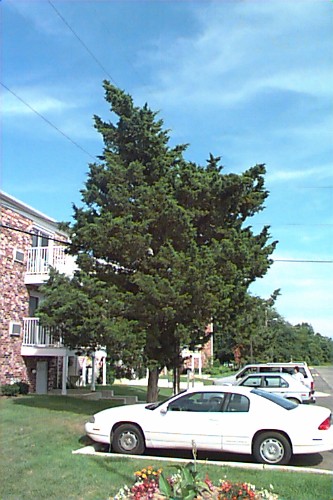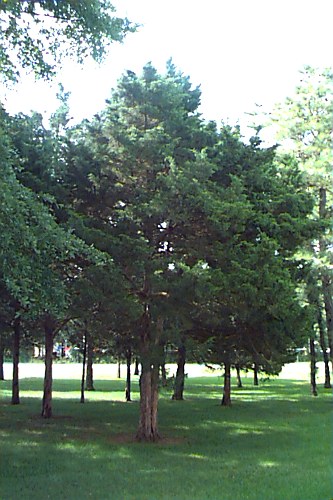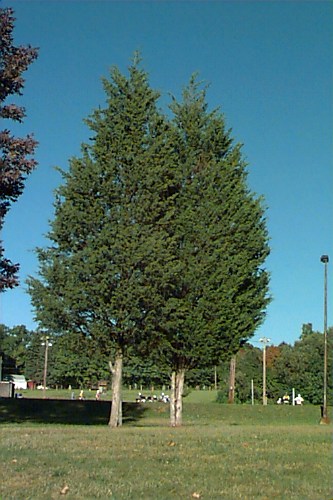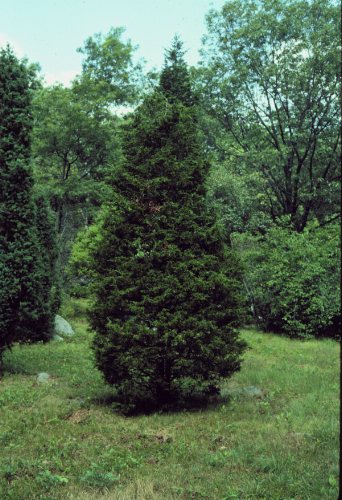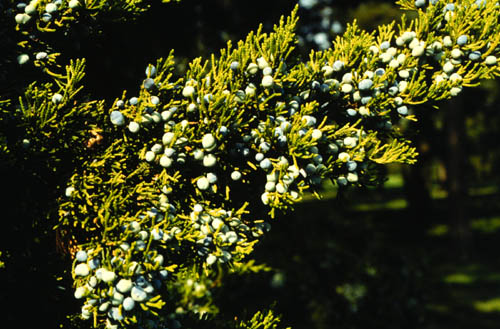Juniperus virginiana
Eastern Redcedar
Cupressaceae
ExpandHabitat
- native to east and central North America
- zone 3
- often an early colonizer of old farm fields
- commonly found along interstate highway medians
Habit and Form
- evergreen tree
- conical shape in youth, opening with age
- 40' to 50' tall by 8' to 15' wide, usually smaller than this
- moderate growth rate
- medium texture
Summer Foliage
- scale-like and awl-like leaves
- arranged in a 4-rank pattern
- needles are closely pressed to stem and tend to overlap
- needles are pointed
- medium green in color
- needles have a strong cedar scent to them
Autumn Foliage
- evergreen
- needles have a bronze cast during cold months
Flowers
- plants can be monoecious or dioecious
- male flower yellow and female green
- male flowers have 10-12 stamens
- blooms in late winter
Fruit
- berry-like cones, mature in one year
- 0.25" in diameter
- waxy, blue appearance
Bark
- reddish brown coloring
- shreds in long strips
Culture
- easily transplanted
- tolerant of most conditions
- pH adaptable
- full sun
Landscape Use
- specimen
- screen
- mass plantings
- groupings
- windbreaks
- foundation plantings
- wood used for cedar products, fence posts
- difficult sites
Liabilities
- susceptible to bagworm and cedar-apple rust
- source of many allergy problems due to pollen, especially in the south
ID Features
- both scale-like and awl-like foliage
- medium green needle color
- bronze winter color
- needles arranged in a 4-rank pattern
- waxy, blue fruits; small
- needle tips pointed
- branches have a strong cedar scent
- upright form
Propagation
- by cuttings for cultivars
- by seed
Cultivars/Varieties
'Burkii' - This pyramidal 20' tall plant has blue-green needles with a purplish cast in winter. It is a non-fruiting male clone.
'Canaertii' - A common cultivar, this plant grows as a compact pyramid to perhaps 25' tall after many years. The deep green needles are borne on the tips of the branches and the profuse fruit are bloomy blue.
'Emerald Sentinel' - This is a new pyramidal, columnar for growing 20' tall and only 8' wide. The foliage is dark green and the color is held well in winter. It is a fruiting female variety.
'Glauca' - This name serves as an umbrella for many clones with bluish needles, often fading in summer. Most grow 15'-20' tall with a pyramidal form. 'Manhattan Blue' is similar, growing to 12' tall.
'Grey Owl' - A low spreading form to 18" tall with 3' to 6' spread, this plant bears fine, feathery foliage of a silver-blue color. It is a compact, spreading grower only growing 6' tall but much wider in time. It is an abundant fruiting clone.
'Hillspire' - This male clone assumes a symmetical pyramidal habit with healthy green foliage. The foliage color is maintained in winter.
'Pendula' (also listed as f. pendula) - Many clones carry this name, and most have spreading limbs with pendulous branchlets. They can grow to 40' tall and feature abundant blue fleshy cones.

